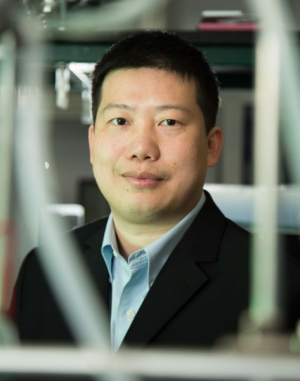If there’s one thing Yan Yao gets a charge out of, it’s the idea of creating a better battery. The Cullen College assistant professor of electrical and computer engineering is known for being the most current in the battery industry. A Google search yields more than 16,000 citations of papers by Yao. If you read any of them, you’ll learn that if all goes as Yao has it planned, soon there will be safer batteries that last longer. In fact, he may just be responsible for saying goodbye to your old jumper cables and stopping your hover board from exploding.
Having built this kind of reputation in the energy storage field, it’s no surprise that the Research Corporation for Science Advancement came calling, naming Yao a Scialog Fellow in their newly created category – wait for it – “Advanced Energy Storage” (AES). Scialog (a mixture of science and dialog): AES is a program involving early career rising stars interested in pursuing collaborative, high risk, highly impactful discovery research on untested ideas applicable to creating breakthroughs in energy storage.
“I am honored to be named a Scialog Fellow. The program director invited me to apply. A senior professor in the battery community had nominated me based on my work over the last five years,” said Yao. “I think it’s recognition of my prior work.”
To capture all his prior work you’d have to recharge the device on which you’re reading this article, but there are a few outstanding accomplishments among many.
Beyond Lithium-Ion
For his work in creating better, safer batteries, Yao has won the Robert A. Welch Professorship by UH’s Texas Center for Superconductivity (TcSUH), the Ralph E. Powe Junior Faculty Enhancement Award from the Oak Ridge Associated Universities and the 2013 Office of Naval Research Young Investigator Award. His battery research program has been well funded through the National Science Foundation, Department of Defense, Department of Energy and most recently, NASA.
Now, as a Scialog Fellow, Yao will set out to meet their challenge – to search for and discover truly transformative energy storage systems. Fortunately, he’s already on track. In his laboratory, he’s already developing the next-generation of aqueous (water-based) batteries, which will last ten times longer and be five times more powerful than the ones currently in your car.
No battery slips his attention.
“The traditional lithium-ion battery technology is approaching its limits and could be dangerous in situations when the flammable electrolyte catches fire,” said Yao, seemingly disturbed by the mere thought. He is working with those and the aqueous batteries, which are safer but have a limited life cycle. Think, again, of your car battery, which never fails to surprises you with its need to die at the completely wrong time.
“The energy is not dense enough,” said Yao. “You want to combine the safety of aqueous batteries with the high energy density of lithium-ion batteries – that would be ideal.”
Yao will work with a team of other Scialog Fellows to use computational analysis and experiments to add more perspective on the fundamentals of his research on aqueous batteries, magnesium batteries, and all-solid-state lithium metal batteries.
And eventually he will, no doubt, reach his ultimate albeit high-powered goal: “To not only change technology but to change people’s lives and the world,” he says.
